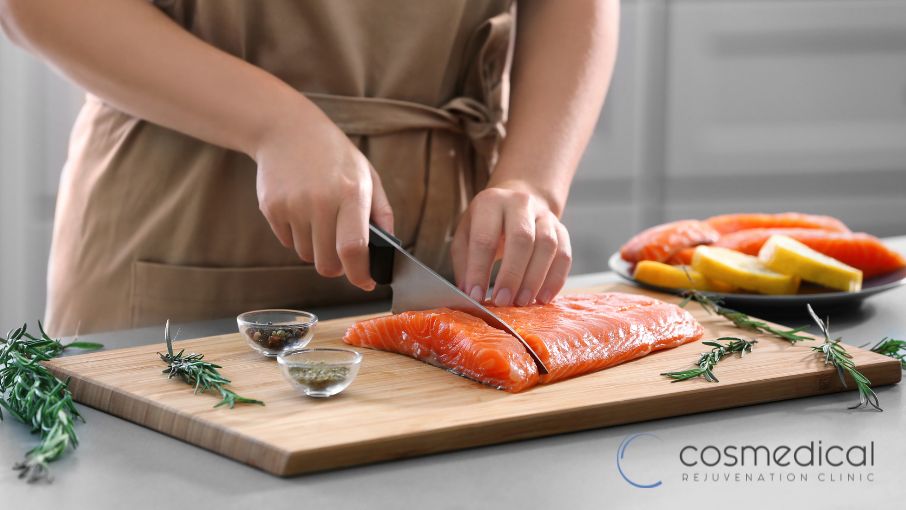
What to Eat After Breast Augmentation
Studies show that proper nutrition after cosmetic surgical procedures like breast augmentation, can reduce recovery time by up to 30% and significantly decrease complications.
Protein-Rich Foods
Daily Target: 0.8-1g per pound of body weight. Great sources of protein include lean poultry, fish (especially salmon), eggs, Greek yogurt, and legumes. Research shows patients who consume adequate protein have 40% faster wound healing rates.
Anti-Inflammatory Foods
Studies indicate that patients who incorporate anti-inflammatory foods experience 25% less post-operative swelling. Great sources of anti-inflammatory foods include berries (they contain up to 50% more antioxidants than other fruits), leafy greens, nuts and seeds, olive oil (73% anti-inflammatory compounds), and turmeric (contains curcumin, which reduces inflammation by up to 60%).
Vitamin C-Rich Foods
Doctors recommend patients get 500-1000mg daily during recovery to reap the benefits. Great sources include citrus fruits (1 orange = 70mg), bell peppers (1 red pepper = 95mg), broccoli, kiwi, and sweet potatoes. Research shows that vitamin C supplementation can reduce recovery time by up to 20%.
Iron-Rich Foods
A daily target of 18mg is recommended. Sources include spinach, lean red meat, quinoa, lentils, and dark chocolate. 30% of surgery patients experience temporary iron deficiency.Fibre-Rich Foods
40% of post-surgery patients report constipation issues. Don't get stopped up! Reach a goal of 25-30g daily from sources like whole grains, fresh fruits, vegetables, and oatmeal.
Foods That Can Hinder Your Recovery
Understanding which foods to avoid is just as important as knowing what to eat during your recovery. Clinical studies have shown that salty foods can significantly impact your healing, increasing post-operative swelling by an alarming 45%. Processed foods should also be eliminated from your diet as they've been proven to slow the healing process by 30%. While you might be tempted to have a glass of wine to relax, alcohol consumption can increase post-surgery complications by 35%. Your morning coffee habit may need to take a brief pause, too - caffeine can contribute to dehydration by 25%, potentially compromising your recovery. Additionally, those sugary comfort foods you might crave can increase inflammation by 40%, potentially extending your recovery timeline.
The Importance of Preparation
Recent market research has revealed some compelling insights about post-surgery nutrition planning. A significant majority - 65% of patients - report difficulties with meal planning after their procedure. Even more telling, 82% of patients wished they had prepared their meals in advance. The data strongly supports the value of proper nutrition, with 73% of patients reporting improved recovery when following a pre-planned nutrition strategy. Perhaps most significantly, 88% of patients emphasized that proper nutrition guidance played a crucial role in their recovery process.
Setting Yourself Up for Success
Healthcare professionals consistently recommend several key strategies for optimal recovery. First, prepare 2-3 weeks worth of meals before your surgery date. This preparation ensures you'll have nutritious options readily available when you need them most. Structure your daily intake around 5-6 small meals rather than three larger ones, which can be easier on your system and help maintain steady energy levels. Make sure to stock your recovery space with easily accessible, healthy snacks to avoid the temptation of less nutritious alternatives. Finally, have at least a 7-day supply of any recommended supplements on hand before your procedure. This comprehensive approach to preparation can significantly impact your recovery experience and help ensure the best possible outcome from your surgery.
Call (647) 493-8177